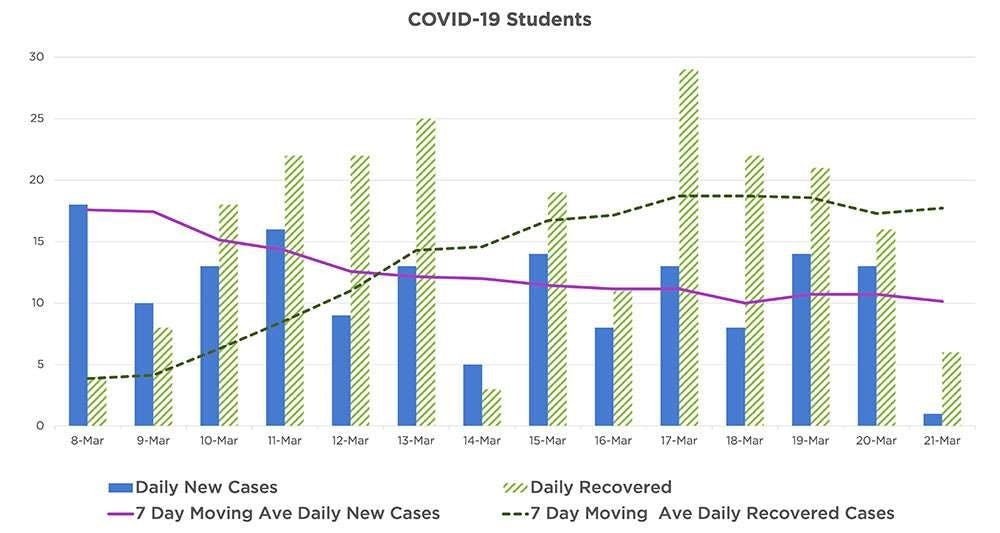Despite relatively low numbers at the beginning of the spring semester, COVID-19 cases are once again on the rise at Miami University.
At the beginning of March, the number of active COVID-19 cases was “still considerably low compared to this point last semester,” with 129 active cases reported on Feb. 28. As of Sunday, March 21, there are 155 estimated active cases.
According to the university’s COVID-19 Dashboard, four residence halls – Hamilton, MacCracken, Richard and Porter – have been identified as a Level 4 Advisory Level.
One residence hall – Presidents – has been identified as a Level 3 Advisory Level as of March 21, 2021.
Level 4 Advisory Level residence halls have at least one floor where no less than 5% of residents tested positive in the last week, and there is statistical evidence of a cluster. Level 3 Advisory Level residence halls have at least one floor with three or more positive tests in the last week.
Kendall Leser, director of the public health program, said the rise in COVID cases at Miami may be related to a false sense of hope after the recent fall in cases across the nation.
“We’ve been seeing improvements with case numbers going down across our state and across our nation, so people may be thinking we’re out of the woods and we’re clear,” Leser said. “People are just getting used to it; it’s been a little over a year and we’re ready to go back to normal.”
However, she warned against students letting their guard down, stressing that coronavirus is still an extremely contagious disease.
“If there’s an increase in cases, that means there are more students going to social events [and] not practicing six feet of distancing,” Leser said. “The disease spreads person to person, so if there’s an increase that means people are close together.”
Carole Johnson, associate director of university news and communications, agreed.
“The more interactions students have with others, the more opportunity it is for a student to contract COVID-19,” Johnson wrote in an email to The Miami Student.
Johnson wrote Miami’s current procedure for isolating clusters is “to place those students who have tested positive with COVID-19 in isolation in separate residence halls we have designated specifically for isolation and quarantine. Our Remain-in-Room program is designed to reduce spread.”
Enjoy what you're reading?
Signup for our newsletter
Along with the Remain-in-Room process, Miami also uses its testing to track where new cases are coming from.
“We use a scientific sampling process that allows us to identify potential hotspots and quickly mitigate the spread of the virus,” Johnson wrote.
Matthew Duffy, a first-year marketing major who recently left isolation at Dodds Hall, isn’t quite sure of where he caught the virus.
“I honestly don’t know,” Duffy said. “I don’t have any inkling about it … it could have been anywhere.”
However, he believes his case was handled well.
“I think [Miami is] doing a pretty good job,” Duffy said. “They brought food when I required it, and there was a nurse that came in and checked on me.”
If cases in residence halls continue increasing, Johnson wrote Miami would be prepared in terms of available beds for students in isolation.
Both Johnson and Leser stressed following safety guidelines, mainly avoiding social gatherings and social distancing, no matter where students live.
“It doesn’t matter if you are in a residence hall or you’re off-campus,” Leser said. “If you’re at the same event and the disease is there, and you have it, you’re going to take it and bring it back to where you live.”




